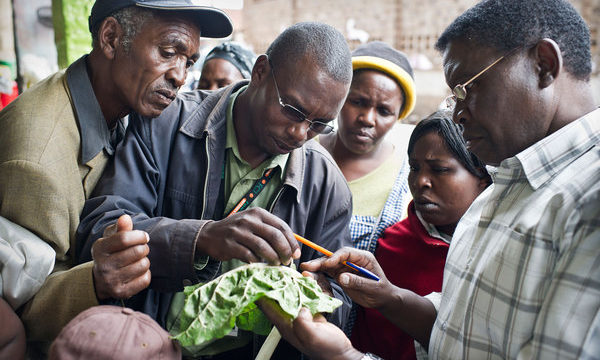The most prestigious prize in food and agriculture, the World Food Prize, has this year been awarded to three scientists, Belgian Marc Van Montagu and Americans Mary-Dell Chilton and Robert T. Fraley for their work on agricultural biotechnology. These scientists have all worked on different projects with one goal in mind: to develop better crops in order to increase yields and reduce losses. These include crops resistant to pests and diseases, crops that can grow in extreme environmental conditions and ultimately, crops with higher yields.This is all possible with the developments that these scientists have made in biotechnology and the crop varieties produced as a result. Today, biotech crops make up about 12% of the world’s arable land, with just over half of this 12% being in developing countries. The major commercial biotech crops are maize, soybeans, rapeseed and cotton but many more food crops have been developed using this technology.
The first pioneer for agricultural biotechnology was Dr. Marc Van Montagu of Belgium. In 1974, Van Montagu and researcher Jeff Schell discovered that Agrobacterium tumefaciens, a bacterium that causes plant tumours, carries a large circular molecule of DNA (the “Ti plasmid”). They discovered that it was this plasmid that carried the tumour-forming genes into plants.
It was Dr. Mary-Dell Chilton’s research team that then demonstrated that only a small section of the Ti plasmid (T-DNA) transfers into the plant cell’s genome. By placing desired genes in this section, very precise changes could be made to an organism.
Building on this work, Dr. Robert T. Fraley focused on developing practical gene transfer methods. Fraley and his team isolated a marker gene and inserted it into A. tumefaciens, allowing the transfer of an immunity trait into petunia and tobacco cells.
Van Montagu, Chilton, and Fraley each presented their research at the Miami Biochemistry Winter Symposium: “Advances in Gene Technology” in 1983.
Since the 1983 symposium, advances in agricultural biotechnology have continued to progress, and all 3 scientists remain influential characters in the biotechnology world. The technology is well established and their focus now is on its successful application and implementation, ensuring that farmers around the world have access to the benefits of new crop developments. Fraley is especially interested in making biotechnology available to small-holder farmers who, according to a recent ISAAA (International Service for the Acquisition of Agri-biotech Applications) report, made up almost 90% of the 17.3 million farmers who grew biotech crops worldwide in 2012.

The Flavr Savr tomato was first sold to the public almost 20 years ago, but biotech crops remain controversial to some.
The ISAAA also reported that 328 million tons of additional food, feed and fibre were produced from biotech crops between 1996 and 2011, and the adoption of transgenic crops is expanding at a rate of 8% per year. Despite this, the technology remains controversial and many consumers are waiting on more research into the health and environmental effects before making their mind up on transgenic crops.
With the world population still increasing, and malnutrition still high, it is hoped these advances will help to provide nutritional and plentiful food for future populations.
Sources
The World Food Prize- 2013 laureates- http://www.worldfoodprize.org/en/laureates/2013_laureates/
2 Comments
Leave a Reply
Related News & Blogs
Biotechnology aiding the fight against cowpea pest damage in Africa
Cowpea is a staple crop in West Africa and is the most widely planted native legume (Image by Tom Rulkens) Cowpea (Vigna unguiculata), a staple crop in West Africa, is consumed by more than 200 million people a day and is an important source of income…
20 July 2021



[…] World Food Prize 2013 winners announced (plantwise.org) […]
Reblogged this on Science on the Land and commented:
argylesock says… Here’s news about scientists receiving the World Food Prize. These winners are scientists who developed the methods used to make genetically modified (GM, also called genetically engineered, GE) crops. You can read more under my ‘genetic modification’ tag.